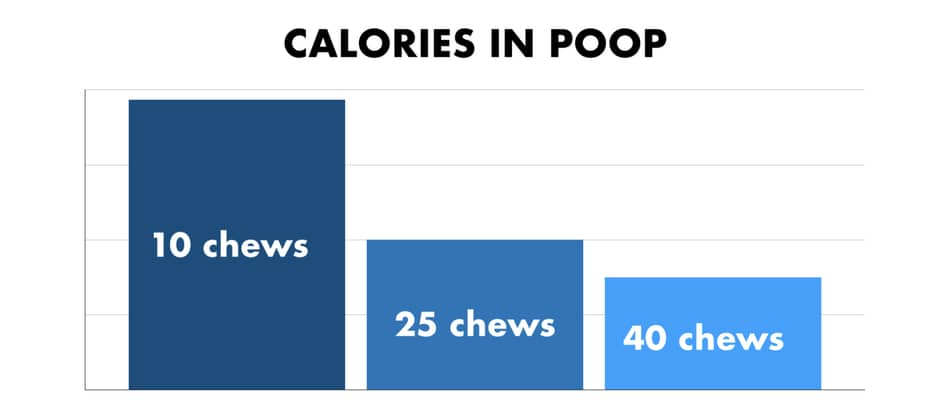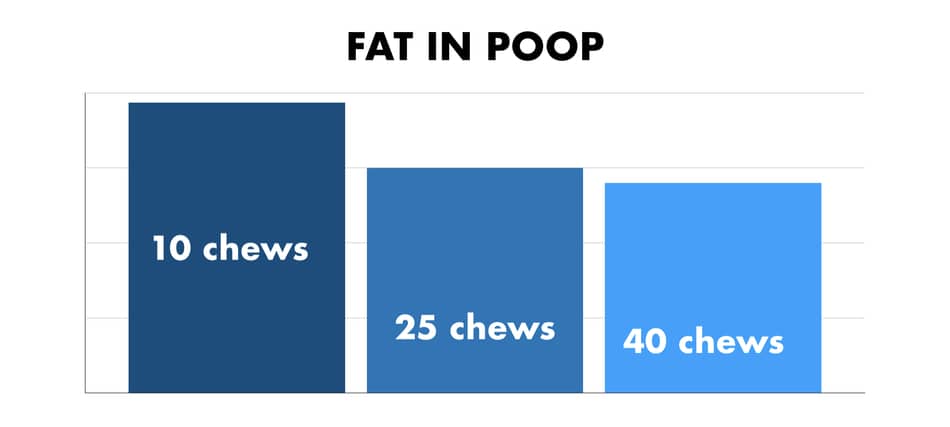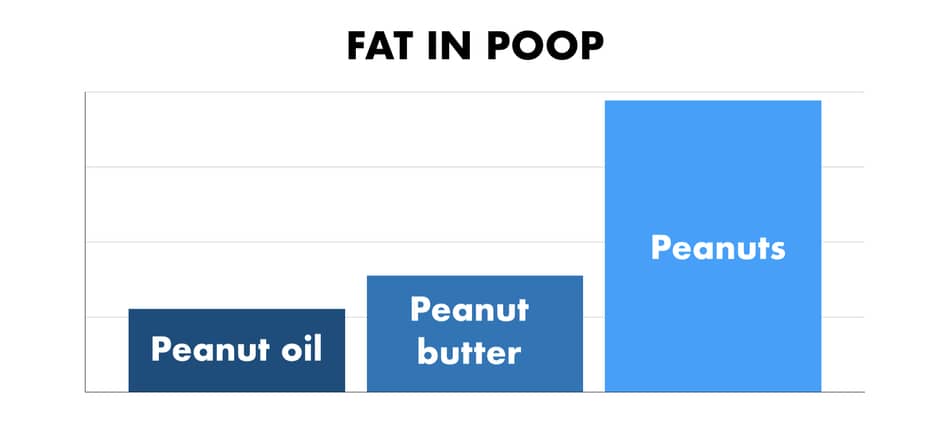
Did you know that measuring calories in poop by collecting stool samples is one of the standard methods for assessing the health of the microbiota and nutrient absorption? Let’s see how this process works and what affects the number of calories in poop.
What poop says about diet?
Surprisingly, a lot.
According to the National Institute of Diabetes and Digestive and Kidney Diseases (NIDDK), there is approximately 4.91 kcal per gram of stool as not all macronutrients can be easily absorbed in the digestion process.
The NIDDK states that the number of calories in poop depends on fecal energy losses, including fiber, fat, as well as the duration of eating.
Human poop does have calories
You would think that all the calories we eat can be easily absorbed via the gut. This is not always the case.
Not all the macro and micronutrients aren’t sufficiently absorbed in the intestinal tract.
The number of calories will depend on number of factors, including the microbiota’s health, nutrient absorption rate, and type of food you consume.
Yes, you do poop out calories!
Not all foods (and not all calories) are created equal.
High-fiber foods can trap some of the nutrients in the stool, which makes it harder to extract and absorb, says Bridget Cassady, PhD, a researcher from Abbott Nutriiton.
“Some foods like nuts have limited bioavailability, which means not all calories are being absorbed,” says Dr. Cassady.
Calories, poop, and almond experiment
The number of calories u lose when pooping depends on the food you eat and the number of chews you make during eating, explains Dr. Cassady.
In her research published in The American Journal of Clinical Nutrition, Dr. Cassady documented how much energy is being lost in the stool from eating nuts.
She also looked at the correlation between calories absorbed and the number of chewing performed during eating.
The group of 13 healthy adults masticated 5 grams of almonds on three separate visits, on three consecutive days.
Participants were instructed to increase number of chews with each visit (see table below).
| Day | Number of chews |
|---|---|
| 1 | 10 chews |
| 2 | 25 chews |
| 3 | 40 chews |
After each day, the participants had their stool collected and measured to assess fat and calorie content.
How many calories do we poop out?
Dr. Cassady explains that people who chew their almonds 10 times (during first visit) had the most amount of calories in the stool (4,900 KJ).
In the contrary, people who chew almonds 40 times had more calories absorbed and significantly less in the stool (3100 KJ).
Number of calories in poop
(See the graph below.)

Does poop have fat?
Some of the fat isn’t sufficiently digested and absorbed in the gastrointestinal tract. The amount of fat in the poop will depend on various factors like the fiber content of the food and incomplete mastication.
For instance, people who eat fast (and gobble on their food) can absorb less fat. On the other hand, people who eat slowly, are more likely to absorb more nutrients.
Dr. Cassady’s study also looked a the fat content in the poop (the same study where people were chewing almonds).
“People who chew their food longer had more fat absorbed, and people who only chewed almonds 10 times had more fat content left in the stool,” says Dr. Cassady.
See how does the results look on the graph.

Lessons learned
I love to read and share here this type of experiments. For me, there are couple of lessons we can takeaway.
First, this experiment shows us that number of calories absorbed from food is directly related to the number of chewing.
(Less chewing, more caloires in poop. More chewing, less calories in poop.)
Second, slow eating has a secondary impact on satiety. More chewing stimulates satiety mechanisms (we feel satisfied and no longer hungry).
NOTE: This does not mean eating fast is better. It’s the opposite. You may think that you get fewer calories from chewing less, but in the long term, your satiety gets lower. Which means you get hungry sooner.
Third, you cannot poop out excess calories once they are all digested and absorbed.
The only way to poop out calories is when your digestive tract cannot absorb nutrients efficiently so they stay in the stool and leaves the body with the bowel movement.
Does poop have nutritional value?
(Obviously, I’m talking about the nutrients in poop from the science perspective, not as a potential food source.)
According to the Nishimuta Mamoru, Ph.D., a researcher at the J-Global, “some of the micro and macronutrients aren’t properly digested and absorbed”.
“The number of micronutrients like sodium, calcium, or potassium in the poop varies depending on the moisture content.”
Dr. Mamoru’s study done on 11 young Japanese female students showed that the moisture content of the poop range between 53 and 92%.
“The higher the moisture levels, the higher the concentration of minerals in the stool,” says Dr. Mamoru.
With having this in mind, I spend number of hours searching on another study that can take into consideration the type of food and the calorie content in poop.
Here is what I found.
Calories, poop and peanut butter experiment
Allen S. Levine, Ph.D., a professor from the University of Minnesota, made an experiment to measure fat absorption (and fat stool content) from the diet containing one source of fat in three physical forms.
- whole eanuts
- peanut oil
- peanut butter
“Calories in poop were the greatest after eating whole peanuts, compared to processed peanut oil or butter,” says Dr. Levine.
(see the graph below).

(Here is the link to aforementioned study.)
Takeaway from this experiment
For me, the biggest takeaway is that some foods (whole nuts, in particular) are not fully digested and absorbed by the intestinal tract.
This can increase the number of calories in poop.
On the contrary, more fat is absorbed from processed types of foods like peanut butter or peanut oil, compared to whole peanuts.
So, the type of food you eat indicates how much energy the body absorbs and how many calories are lost during pooping.
Can you lose weight by pooping?
I don’t think so, ahah.
Pooping does ‘reduce’ your weight, but this is only the waste weight (not the body fat).
To lose weight, the body needs to be in a calorie deficit, which starts to utilize stored body fat. Pooping reduces traces of weight, temporarily.
More specifically, during defecation, you lose several undigested particles of food, water, and gut bacteria.
And, foods that contain more soluble and insoluble fiber lead to greater stool volume and lower calorie absorption.
Ok, how much weight do you lose when you poop?
On average, you can lose around 50 – 150 grams of weight when you poop, according to the article I found on Pubmed.
(Not a lot.)
The size and weight depend on the amount of water you drink throughout the day and the amount of fiber.
For instance, diet rich in high-fiber foods and enough water, can lead to greater defecation (stool size) and increased transit time. (This increases the weight of the poop.)
On the other hand, diet rich in highly-processed foods and low water consumption can lead to lower defecation.
How many calories does pooping burn?
Every process in the human body requires energy, which means we do burn some amount of caloires.
(No exception with pooping.)
Pooping is an essential part of diet-induced thermogenesis (DIT), and it contributes to around 200 – 300 kcal (10% of total daily calorie expenditure).
Things that contribute to DIT include:
- fecal transit;
- bowel movement;
- digestion;
- food absorption; and
- nutrient transportation.
Total daily energy expenditure consists of three main components: basal metabolic rate, diet-induced thermogenesis, and physical activity.
The most metabolically expensive is the basal metabolic rate (70%) followed by physical activity (10-20%) and diet-induced thermogenesis (10%).
How many calories do you need to eat to poop?
“Generally, pooping is not related to the number of calories eaten, but more to the amount of fiber,” says Peter L Beyer, MS, RD, a professor from the University of Kansas.
“In our experiment, people who had a low-fiber diet, on average had smaller stool volume (51 grams) and one bowel movement every 33 hours,” explains Dr. Beyer.
“In the contrary, people who consumed more fiber had their stool weigh 151 grams (on average) and the frequency of one bowel movement every 19 hours.”
Here, you can find link to the Dr. Beyer study he is taking about.
Do you poop more when you lose fat?
No. Bowel movements are unrelated to fat loss. In fact, during a calorie deficit, it is normal to see less frequent bowel movements because of reduced total food volume and calorie intake.
Conclusion
Poop energy losses depend on a variety of factors like macronutrient composition, fiber and water amount, and also chewing.
People who chew their food for longer may absorb more calories, however, this process initiates better satiety and fullness.
